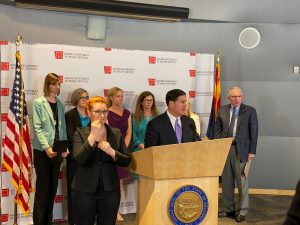- Slug: BC-CNS Arizona COVID Update, 865 words.
- 2 photos and captions below.
By Valerie Gonzales and Victoria Stibrik
Cronkite News
PHOENIX – Despite accelerated federal assistance, school closures, cancelations of public gatherings and businesses limiting services that require human contact, cases of of COVID-19 in the United States continue to rise.
Here’s what you need to know about the fast-spreading respiratory virus that causes COVID-19.
As of March 19, Arizona health officials have confirmed 44 cases of the disease, according to the Arizona Department of Health Services. Results are pending on 130 others, it said.
On Tuesday, Phoenix Mayor Kate Gallego declared a state of emergency for the city, resulting in the closures of bars and in-restaurant dining. Restaurants moved to takeout, and fast food places are drive-thru only. Similar declarations have been made in San Francisco and other major U.S. cities.
Gov. Doug Ducey and Superintendent of Public Instruction Kathy Hoffman have announced that Arizona schools will be closed through March 27, according to the Governor’s Office.
Arizona’s first confirmed case of COVID-19 was diagnosed in January, shortly after a man in the Arizona State University community returned from Wuhan, China, where the novel coronavirus was first detected in late December. University officials say that man has recovered and been released from isolation.
To date, health officials say 331 people have been tested for COVID-19 in Arizona. Maricopa County has the most cases (22), followed by Pinal County (10), Pima County (7), Navajo County (3), Graham County (1) and the first confirmed case in Coconino County. Because of medical privacy laws, authorities will only reveal ages and the county where the affected individuals reside.
On March 19, the Centers for Disease Control and Prevention reported that the U.S. death toll rose to 150, with 10,442 cases confirmed in all 50 states and the District of Columbia, Puerto Rico, Guam and the U.S. Virgin Islands.
Late Wednesday, the Senate approved and Trump signed a $46 billion emergency funding request known as “phase two” of the legislation meant to blunt the effects of the pandemic and shore up the U.S. economy.
COVID-19 symptoms
COVID-19, which the World Health Organization says has killed more than 7,800 around the world, can be difficult to detect and monitor. Symptoms in confirmed patients ranged from none to mild to severe, according to the Arizona Department of Health Services. Symptoms may appear two to 14 days after exposure to the illness, and can include:
- Fever
- Cough
- Shortness of breath
The virus is thought to spread mainly from person-to-person, likely through direct contact with respiratory droplets from coughing or sneezing.
With most respiratory viruses, people are most contagious when they’re exhibiting symptoms. With COVID-19, there have been reports of spread before patients exhibited any symptoms.
Prevention tips
There’s no vaccine to prevent COVID-19 or a cure for it, though some patients recover. Arizona health officials suggest the following actions to help prevent the spread of the illness:
- Wash hands often with soap and water for at least 20 seconds. If soap and water are not available, use an alcohol-based hand sanitizer that contains at least 60% alcohol.
- It is especially important to clean hands after going to the bathroom; before eating; and after coughing, sneezing or blowing your nose.
Avoid touching your eyes, nose and mouth with unwashed hands. - Stay home when you’re feeling sick.
- Avoid close contact with people who are sick.
- Cover your cough or sneeze with a tissue or your sleeve (not your hands).
- Clean and disinfect frequently touched objects and surfaces.
Testing for coronavirus
Travel is a major factor in deciding whether to get tested, state health officials said. Seek testing if you’ve had a fever and respiratory symptoms within two weeks of travel from China, or have had close contact with someone who has the symptoms and has traveled to China. Call your health care provider before your visit to alert them of your symptoms and exposures, according to the Arizona Department of Health Services.
The kit developed by the CDC tests for severe acute respiratory syndrome coronavirus (SARS-CoV-2), which is the virus that causes COVID-19. These tests can only be conducted in United States’ laboratories the CDC has designated as qualified.
Arizona began commercial testing Wednesday to produce faster results. The state has vowed to provide testing outcome updates daily, and national updates are expected from the CDC on Mondays, Wednesdays and Fridays.
Travel
The U.S. State Department Thursday to advised Americans to avoid all overseas travel, issuing a Global Level 4 Health Advisory.
Travel out of Phoenix Sky Harbor International Airport will continue, airport spokesman Gregory E. Roybal said, and “public health officials have not requested any specific changes to Phoenix Sky Harbor’s standard health and safety protocols related to the virus.”
On Thursday, the airport announced that two of the four Transportation Security Administration checkpoints in Terminal 4 have been closed, as has the TSA Precheck center in Terminal 4, which expedited clearance of preapproved, low-risk passengers.
On Tuesday, airport officials reported a drop the number of international flights that travel through the airport, with airport spokesperson Krishna Patel telling The Arizona Republic passenger traffic has dropped by 30% over this time last year.
In addition to regular 24-hour cleaning, the airport has increased the sanitation of “high-touch areas,” such as escalator railings, Roybal said. The Phoenix Aviation Department is in touch with health officials and will take action as directed.
Connect with us on Facebook.
^_=

